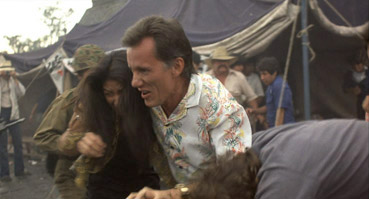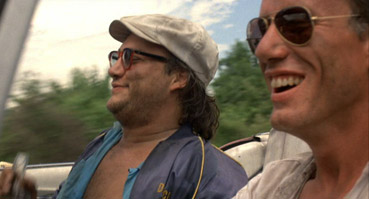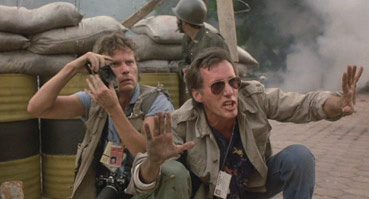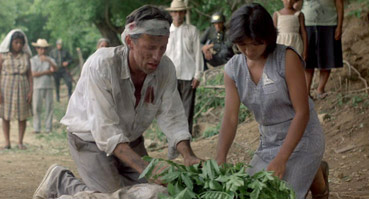|
Oliver
Stone is one of American cinema's most
compelling figures. A Vietnam veteran who admits to spending
a few years in a drug haze, he has a catalogue of internationally
acclaimed features to his name but remains a filmmaker
who seriously divides opinion. Pauline Kael famously
stated that one of the advantages of retiring from film criticism was that
she would never have to watch another Oliver Stone film,
and Stone's repeated tinkering with historical fact has
earned him a good many detractors. But for just as many he is a
director of fierce talent and conviction, as well as being that
rarest of modern day beasts – a politically committed filmmaker
working within the Hollywood mainstream. Stone's technical
skills have been repeatedly demonstrated – the extraordinary
editing in JFK and the eye-popping experimentation
in Natural Born Killers are just two examples – but
it's the passion he brings to his best work is what really marks
it out, and nowhere is this more evident than in his blistering
third film, Salvador.
Based
on a true story, Salvador opens on down-on-his-luck
journalist Richard Boyle at somewhere close to rock bottom.
He is broke, facing eviction from his run-down apartment,
and about to lose his young child and his angry, at-her-wits-end Italian wife. Boyle badly needs a job, but his volatile temper and twitchy unreliability has rendered him almost
unemployable. Believing there may be a story down in politically
unstable El Salvador, he tricks his pill-popping friend
Dr. Rock into accompanying him on what he assures him will be a fun
trip, a combination of work and pleasure in a country in
which he has political enemies and powerful friends,
and a girlfriend and child he has not seen for some time.
But El Salvador is a dangerous and unpredictable country, and
Boyle quickly finds himself unable to maintain his
cheerful cynicism and stay detached from the social upheaval
he initially went there to record.

Stone sets up his characters and situation with dazzling economy. In just fifteen minutes of screen time, he introduces
us to Boyle and Dr. Rock, establishes the full extent of
Boyle's financial, relationship and work-related problems,
separates him from his wife, gives us a detailed breakdown
of his personality traits and his relationship with Rock,
and transports both men to El Salvador and into the belly of an armoured
vehicle, convinced that they are to be killed by the
local militia. It's a breathless, brilliant opening
that invisibly blends drama, comedy, politics and nail-biting
tension – despite occurring far too early to present a logical threat to the lead character’ safety, their genuine belief that they are about
to die is vividly communicated. This opening also provides a wealth of character detail about Dr. Rock
and (especially) Boyle, both of whom I found myself instantly
warming to. Both are outsiders, reckless adventurers
who embody that wilder side that we tend to keep in check but secretly dream of letting run free. It's this very element
that alienated some critics who seem to prefer their
heroes more traditional and clean cut – Leonard Maltin
memorably complained that the film took its time to engage
him because "the two lead characters are such incredible
sleazeballs." Conversely, for me that was a key aspect of their appeal.
All
of the action is centred around Boyle (the screenplay is based
on the real Richard Boyle's autobiography), electrifyingly played here by James Woods,
who was up for an Oscar and should really have won it, but
lost out to sentimentality – Paul Newman was damned good in The
Color of Money, but come on! Woods plays Boyle with
the sort of high octane energy that ensures you don't have to warm to him to find him compelling as a character. Self-destructive and
self-centred, his gradual conversion to humanitarianism
is impeccably handled and utterly believable. There is a burning rage and devastating
honesty to Woods' portrayal that for me makes it
not only the finest performance of the actor's career to date, but one of
the most compelling in modern American cinema.
But
he is never isolated here. In only his second major dramatic feature role (after Michael Mann's Thief),
James Belushi has never been better, with his memorable
comic moments – the sequence in which he spikes a pompous TV journalist's drink
with acid is an absolute hoot – balanced by scenes in which he really
shows his acting metal. One of my favourites occurs when Boyle returns
to the township in which the two have become residents to be confronted by the tortured and murdered body of a young man
whose life he earlier tried desperately to save. Dr. Rock is standing
with others, even more drunk than usual, and woefully points
to where the body is lying, blurting out with an extraordinary blend of anger and anguish, "He's fucked up! Over there,
man – he's really fucked up bad!" It's an almost throwaway
moment, captured in wide shot, but there's something painfully
real about Belushi's delivery and the non-specific nature
of the line. It's an authenticity that's carried through to the supporting cast, notably
the too-rarely used John Savage as committed Newsweek photographer
John Cassady and Michael Murphy as Ambassador Thomas Kelly. Even the smallest roles here have been cast with care.

Stone
is dealing with real events here and is clearly doing so through
Western eyes rather than those whose lives were directly
affected by them. The political upheaval of an entire country
inevitably becomes a backdrop for the story of the political
and emotional awakening of a troubled outsider, and the story is
almost always seen from his perspective. Stone's legendary
tinkering with pure fact aside, this leaves the film open
to the charge of presenting Central American political events
from an North American viewpoint, which itself should set
alarm bells ringing. It's thus to Stone's credit that key historical
incidents – the assassination of Archbishop Romero, the
uncovering of the bodies of a group of murdered nuns – are handled
with respect and almost documentary realism, even if the events leading
up to them are partially fictionalised to personalise
them within the narrative structure. Stone also kicks against present
US mainstream expectations by siding with the rebels – the
ruling, US-backed right wing government is portrayed as
corrupt, immoral and even murderous.
The
approach is honourable and often persuasive, but occasionally
Stone comes close to overplaying his hand. The true-life
rape and murder of a party of American nuns is as horrifying as it should be, but while the yobbish nature of the rapists may well be realistic, the low angle shot of one of them
leering and slobbering over his victim pushes them unnecessarily towards caricature. It's almost as if Stone does not trust
us to be appalled by the assault alone and
feels the need to point out to even the slowest audience
member that these are BAD GUYS. The same is true of the
sequence in which Major Max selects a loyal member of his
staff to assassinate Archbishop Romero, an overly 'performed'
scene that strays as far from the naturalism of Woods and
Belushi as the film gets.
But
these are small blips in an otherwise thunderously effective and
immaculately crafted narrative. The film repeatedly plays
with our emotions to extraordinary effect, hitting hard
when we least expect and at times genuinely frightening.
It also carries a still potent political message about misplaced
US support for fascistic Central American governments in
a way that never feels like a diatribe, partly because it
is so well integrated into the character and situation and is delivered
with genuine passion and conviction. This is particularly evident
in the scene in which Boyle berates the American
military representative Colonel Bentley Hyde for his simplistic
judgements, ending with this assessment of his own position:
"Left wing? Maybe. But I am not a Communist. And that's
the trouble with you people, you've never been able to tell
the difference!"

Salvador
was the first Oliver Stone film I saw (I caught it
in London just a week before Platoon opened and transformed the director's career) and it remains my favourite, despite
some stiff competition. It stands today, along with Roger
Spottiswoode's Under Fire, as one of the very finest
examples of 80's US mainstream political cinema. Would that
there was someone doing such work today.
My
memories of Salvador at the cinema were of an edgy,
grainy, low-budget visual style that I was fully prepared
to see reproduced on the DVD. I was thus doubly startled
by just how GOOD this transfer looks, a view echoed by Stone
on the commentary track. Real care has been taken here:
the picture is sharp, blacks are solid and colour reproduction
is bang-on. A fine job.
A
mention should also go to the main menu, which is very nicely
designed around 35mm film strips and featuring motion grabs
from the film, which are treated with a film wear filter
and presented in an eye-catching manner, accompanied by George Delarue's
urgent opening theme music.
The
soundtrack is solid enough but not one to show off the sound
system. Despite the new 5.1 track, the use of rear speakers
is mainly limited to music, as so often with supposed remixes
of older soundtracks. I should add that this in no way detracts
from enjoyment of the film – the documentary-like style
is well-matched by the mix, though a more dynamic mix during
the action scenes would have added to the already compelling
sense of being there.
Though
not overloaded with special features, those that are here, for
the most part, really do shine.
First
up is an audio commentary by director
Oliver Stone. There are a few dead patches, but when he does talk
he really delivers, giving some fine insight into the film's
production, the real-life Richard Boyle on whom Woods' character
is based, the facts behind many of the key scenes, and his
own strongly held political beliefs. There is some lovely
background on how the film was funded using methods that
were not always above board, and some nice information about
the casting of small roles: Stone's newly born son plays
Boyle's child in the opening scene, the cop who arrests
Boyle over his outstanding parking tickets is played by
top female professional bodybuilder Sue Ann McKean, and small
but memorable support roles are handled by the film's stills
photographer Gary Farr and first assistant director Ramón
Menéndez. Stone is a very
knowledgeable and intelligent speaker and a man of considerable
passion and commitment, something that really comes through
in this commentary,

The
documentary, Into the Valley of Death,
is an absolute treat and probably the best extra on the
disc, as well as being one of the finest of it's sort I
have yet seen. Running at 62 minutes and presented non-anamorphic
16:9, it charts the chance birth and troubled production
of the film and includes interviews with many of the key
participants, including Oliver Stone, James Woods, Richard Boyle and
Robert E. White, the real-life US Ambassador to El Salvador
of the time and the man Michael Murphy's character is based
on. White in particular is invaluable at providing a lot
of the factual and political background to the story. There
is also some fascinating archive material, including powerful
documentary footage of the El Salvadorian civil war, behind-the-scenes
and deleted footage from the movie, even the real-life Boyle
auditioning to play himself in the film. The information
provided is consistently fascinating and drives the documentary
forward at the same sort of pace as the film. Possibly the most
remarkable aspect of these interviews is how brutally honest
many of them are about the problems and personality clashes
that more than once nearly brought the production to it's
knees – says Stone at one point of his sometimes tempestuous
relationship with leading man Woods: "There were times when
I wanted to kill him, I mean kill him, really kill him.
I never felt the urge to violence as I did in that movie
since Vietnam." This is nicely balanced by Woods' own story of how his protestations about checking the chamber of a rifle probably saved his life. A terrific extra that alone almost
justifies the disc's 'special edition' status.
The
four deleted and extended scenes
are interesting, with some giving extra bite to familiar
sequences, particularly Boyle's confrontation with a journalist-hating
worker in a hotel bar. Others, though, have clearly been
dropped for good reason – Major Max's encounter with two
American image makers makes a worthwhile
political point, but the characters are almost ridiculous
parodies and the scene itself as implausible as it would have been out
of place. All are 4:3 from what looks and sounds like a
VHS linear source.
Finally
we have what too often turns out to be huge let-down – the
photo gallery. And it's a huge
let-down, and for the same reasons as usual – if you're going
to include publicity photos, then present them full-screen,
not in a tiny little box in the middle. A completely disposable
extra.
With
US political cinema in the doldrums and shows like 24
and The Agency blindly glamorising the often shifty
work of covert American intelligence agencies, Salvador's
guts and energy are to be treasured. It's a great film,
well presented on a worthy disc. The transfer is very impressive,
the commentary, despite the dead spots, is invaluable for
anyone interested in the director's work, and the documentary
has way more bite than almost all others of its ilk. Highly
recommended.
|